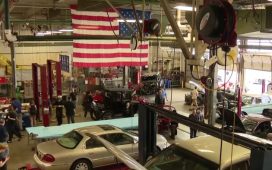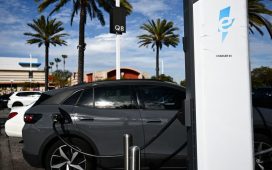The luxury carmaker Bentley is cashing in as more of the world’s richest people opt to spend hundreds of thousands of pounds on “levels of personalisation that we’ve never seen before”, the company has said.
While households all over the world struggle with inflation and the continued impact of the global energy crisis, its chief executive, Adrian Hallmark, said that “our customers can still afford our cars”, even if some were hesitating before committing.
On the whole, the weaker global economy has passed by many luxury car buyers, as the world’s super-rich prove willing to pay enormous sums on customising their vehicles to set themselves apart from the merely very wealthy.
“In the old days it would be one person in Brunei,” said Hallmark, , referring to the small but oil-rich kingdom. However, the carmaker is finding increasing interest from all over the world in a game of global one-upmanship.
That helped the company, owned by Germany’s Volkswagen, make operating profits of €589m (£502m) – its second best ever after 2022 – on sales of €2.9bn in 2023, according to financial results published on Tuesday. It delivered 13,560 cars in 2023, its third-highest retail figure in history.
A Bentley car is already a pricey item, starting at about £170,000. But the wealthiest buyers need more. One buyer ordered a bespoke, one-off car with a sticker price of €2m. On top of that Bentley has quoted another €400,000 of options that “we never even thought of” to create “jaw-droppers”, Hallmark said – such as racy carbon fibre to replace metal components.
Another customer requested that the company use wood from his own forest to make the car’s panels. That and other extravagances – such as a personalised tree emblem stitched on to headrests – pushed the total cost of the car up to £480,000, more than double the standard price.
In practice, relatively few car buyers are able to resist fancy add-ons, even on cheaper cars. Hallmark said his customers spend about £39,000 extra on features such as different colour leather, hand stitching in coloured thread, “jewel fuel caps” and “exotic and sustainable” materials.
Bentley is not the only British luxury carmaker that is pushing personalised options to extravagant levels. Its rival Rolls-Royce Motor Cars, owned by Germany’s BMW, has previously made a car with a paint job containing 1,000 crushed diamonds, and another with a night sky recreated on the roof with LED lights.
The trend for personalisation has waxed and waned over the consumer age. Henry Ford is often credited with creating modern factory production methods, relying on standardisation to churn out cheap cars for the masses. Ford famously enjoyed saying that customers could have “any colour so long as it is black”.
Other companies have found success by going in the opposite direction. Coffee company Starbucks famously asserts that there are 170,000 combinations of options available for its drinks. Bentley can top that, and then some: it claims there are 46bn configurations for its cars.
after newsletter promotion
One option that even the wealthiest Bentley customer does not yet have is buying a car with zero carbon emissions. The company has delayed the launch of its first battery electric car by a year, to 2026, because of problems with getting the right batteries for its needs.
Hallmark said the company was “not walking away from carbon neutrality” with the delay to its first electric model, and that it still planned to go all-electric as each model was replaced. However, the delay means Bentley will continue to sell hybrids, which combine an internal combustion engine with a small battery, beyond 2030.
The UK government under Boris Johnson had initially planned to end sales of petrol and diesel cars in 2030. However, Rishi Sunak U-turned on that decision, pushing back the ban until 2035.
Hallmark said it would be a mistake for a potential Labour government to change course once again if it won an election within the next year, because carmakers needed several years’ notice to adjust production plans. Labour committed in October to pulling the ban back to 2030.
“We cannot react or respond at that speed to these vacillations,” Hallmark said.








